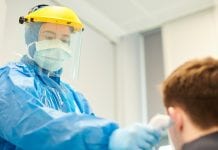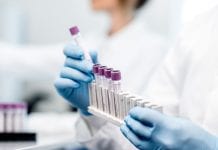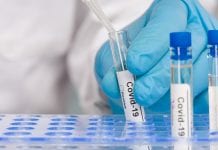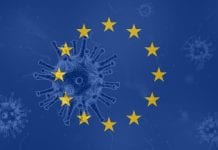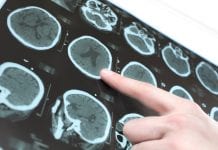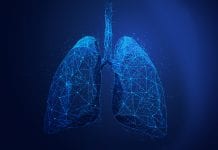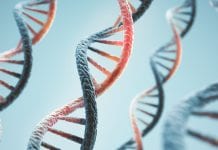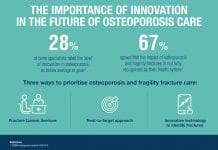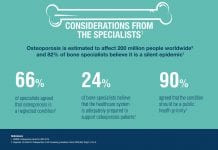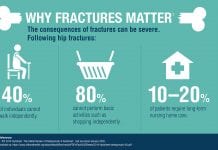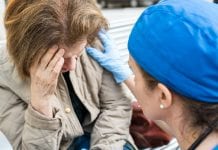Diagnosis and Treatment Related News
COVID-19 and effective cohorting: rapid point of care triage testing
FebriDx® rapid point of care triage testing can help prevent the spread of infection and reduce risk in clinical settings.
The coronavirus 2019 (COVID-19) pandemic...
Improving autism spectrum disorder diagnosis with telehealth
Telehealth can help to accelerate the diagnosis of autism spectrum disorder (ASD), a new study has shown.
A survey carried out by experts from Swansea...
Three new diagnostic kits launched for COVID-19 and respiratory illnesses
Three new diagnostic kits have been launched to help with the diagnosis of COVID-19 and other respiratory illnesses.
BATM, a leading provider of real-time technologies...
The ABC-Cancer project: diagnosis and screening for colorectal cancer
Maastricht University Professor Frederik-Jan van Schooten and Assistant Professor Dr Agnieszka Smolinska tell HEQ about the need for non-invasive biomarker testing for colorectal cancer.
HEQ...
Potential treatment for rare degenerative disease discovered
Researchers have discovered a potential treatment for the rare Wolfram Syndrome – a degenerative disease.
Researchers from Yale have uncovered the mechanism behind a rare...
Timing of COVID-19 antibody test is critical say experts
According to a new study, in order to detect a COVID-19 infection in a patient an antibody test must be carried out at the...
Cognitive impairment treatment options for multiple sclerosis patients
Experts have analysed available treatment options for cognitive impairment in multiple sclerosis patients.
Experts have investigated the efficacy of different treatment and management options that...
Innovating and knowledge sharing to tackle COVID-19 in Europe
Finding solutions to the COVID-19 pandemic in Europe will require innovation in healthcare, collaboration, and knowledge sharing between governments, institutions, researchers, and organisations.
A pan-European...
Mutation discovery could lead to treatment for rare neurological disorder
A team of researchers have discovered a mutation in a protein that can cause a rare neurological disorder – leading to the identification of...
AI collaboration creates largest brain haemorrhage image database
A collaboration between two medical societies and volunteers has created the largest public brain haemorrhage image database.
The creation of the brain haemorrhage image database...
Discover how AI is helping us understand cancer risk in the lungs
Deep learning Artificial Intelligence (AI) algorithms could be utilised as an unbiased assessment tool to help clinicians with assessing risk of lung cancer.
A new...
Rare diseases: better data framework needed to improve diagnostic rates
A new study has found that a better data framework is needed to improve diagnostic rates of rare diseases.
A new study has found that...
Mitchell disease: solving the medical mystery
Scientists have uncovered a genetic mutation that links to the rare Mitchell disease.
A team of researchers led by Dr Hugo Bellen at Baylor College...
Guidelines on COVID-19 testing issued by European Commission
As part of the European Roadmap towards lifting COVID-19 containment measures, the Commission is presenting guidelines on coronavirus testing methodologies.
The guidance aims to support...
The Wellcome Trust’s battle to turn COVID-19 to COVID-Zero
COVID-19 is a global crisis – but a solvable one. The Wellcome Trust is inviting businesses to donate a percentage of funds to help...
Adoption of innovation is essential to the future of osteoporosis care
The reality of healthcare in 2020 is that innovations that can have a positive impact on patient care aren’t always readily available to those...
Treatment for concussions could be as simple as cooling the brain
Cooling the brain could be a viable treatment for concussions in the future according to new research.
The study, conducted by University of Wisconsin-Madison engineers,...
Osteoporosis, fragility fractures and the urgent need for prioritisation of care
Osteoporosis is the world’s most common bone disease; affecting approximately 200 million people globally,1 it results in more than 8.9 million fragility fractures each...
Beyond the Fracture Liaison Service (FLS): addressing the management and treatment gap in osteoporosis
The past few years saw significant progress in the osteoporosis management landscape, but are all patients feeling the benefit?
The introduction of the Fracture Liaison...
Stroke research, treatment and the need for institutional change
Fellows of the European Stroke Organisation tell HEQ about Innovation, strategy and gender in stroke research and treatment.
The European Stroke Organisation (ESO) is a...

